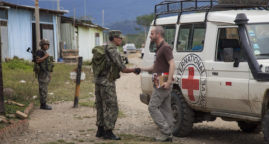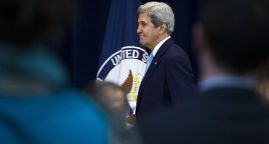Conference on Safeguarding Endangered Cultural Heritage
Article published on France Diplomatie website on 12/03/2016
The President of the French Republic has thus made safeguarding heritage one of the main themes of French cultural diplomacy since February 2013, when he visited Mali with the Director-General of UNESCO, Ms Irina Bokova.
That visit provided an opportunity to begin the reconstruction and restoration process of the Timbuktu mausoleums, but also to begin international discussions on how to:
- better safeguard cultural property threatened by conflict;
- preserve the cultural diversity endangered by terrorist fanaticism;
Following his visit to the Department of Near Eastern Antiquities in the Louvre on 18 March 2015, the day on which the Bardo Museum in Tunisia was attacked, the President assigned Jean-Luc Martinez a fact-finding mission. He retained the main guidelines during the UNESCO General Conference on 17 November 2015, just four days after the 13 November attacks.
The Abu Dhabi conference, the principle of which was presented at the Ise-Shima G7 Summit in Japan last May, was prepared in conjunction with the personal representatives of both Heads of State, Jack Lang, President of the Institut du monde arabe (Arab World Institute), and Mohamed Al Mubarak, Chairman of Abu Dhabi Tourism and Culture Authority. This conference marks both the culmination, so that concrete commitments can be made, and the starting point of a process which will continue into the first half of 2017, with the adoption of a framework resolution at the United Nations Security Council.
The conference will help to put in place new tools to safeguard heritage under threat from terrorism and armed conflict, with: a political statement which commits the 40 participating States to create an international fund open to public and private contributions and an international network of safe havens for endangered cultural property.
The Crown Prince of the UAE worked personally to ensure a high level of representation from the Arab States at the conference on safeguarding heritage, at a time when it is being targeted all over the region by terrorists and fundamentalists. He wanted to ensure that this conference coincide with the UAE National Day.
This event demonstrates the importance of cultural events to the French-UAE relationship. The Louvre Abu Dhabi is the strongest symbol of this. The President of the Republic will visit the building, along with architect Jean Nouvel. The Louvre Abu Dhabi is the first universal museum in the Arab World which will be open to the public in the months ahead. This will be a show of strength in both countries in the fight against extremism and obscurantism, at a time of multiple crises in the Middle East and increased identitarian closure in Western societies.
Abu Dhabi complete Declaration
As a mirror of mankind, a guardian of our collective memory and a witness to the extraordinary creative spirit of humanity, world cultural heritage represents the foundation of our common future.
Today, armed conflicts and terrorism, across all continents are affecting millions of men and women, without sparing their centuries-old heritage. Extremists violently – and often deliberately – attack the cultures of the countries of the people they devastate, seeking to destroy the heritage which belongs to us all.
Threatening, attacking, destroying, and looting heritage represents a strategy to weaken the very foundations of the identity of peoples, their history, and the environment in which they build their lives. Without this heritage, their memory is erased and their future is compromised.
Heritage, in all its diversity, is a source of collective wealth that encourages dialogue. It is a vehicle for closer relations, tolerance, freedom, and respect. Its destruction is a threat to peace, as is the illicit trafficking of cultural property that often emerges in times of crisis.
Therefore, as Heads of States and Governments, and their Representatives, International Organizations and Private Institutions, we are gathered here, in Abu Dhabi, United Arab Emirates, to reaffirm our common determination to safeguard the endangered cultural heritage of all peoples, against its destruction and illicit trafficking. We have decided to collectively join forces.
We commend the call made by the Director General of UNESCO and express support for the Global Coalition “Unite for Heritage,” launched to protect our shared heritage from destruction and trafficking. We welcome the “Strategy for the Reinforcement of UNESCO’s Actions for the Protection of Culture and Promotion of Cultural Pluralism in the Event of Armed Conflict.”
We need to ensure respect for universal values, in line with the international conventions of The Hague of 1899, 1907, 1954, and the latter 1954 and 1999 Protocols, which require us to protect human life, as well as cultural property in times of armed conflict. This process has to be carried out in close liaison with UNESCO, which has worked tirelessly since 1954 to protect heritage, to combat illicit trafficking, and to promote culture as an instrument to bring people closer together and foster dialogue.
In the spirit of universality and the principles of the UNESCO conventions, we are committed to pursuing two ambitious, long term, goals to guarantee the further mobilization of the international community for the safeguarding of heritage:
The creation of an international fund for the protection of endangered cultural heritage in armed conflict, which would help finance preventive and emergency operations, fight against the illicit trafficking of cultural artefacts, as well as contribute to the restoration of damaged cultural property.
The creation of an international network of safe havens to temporarily safeguard cultural property endangered by armed conflicts or terrorism on their own territory, or if they cannot be secured at a national level, in a neighbouring country, or as a last resort, in another country, in accordance with international law at the request of the governments concerned, and taking into account the national and regional characteristics and contexts of cultural property to be protected.
At this conference, we, as Heads of States and Governments, and their Representatives, International Organizations and Private Institutions unite for heritage in support of international efforts to safeguard cultural heritage threatened by armed conflicts and terrorism. A follow up conference in 2017 will help assess the implementation of the initiatives launched in Abu Dhabi and the first projects financed by the international fund.
We recognize the eminent role of the United Nations and its institutions, and particularly of UNESCO, as the only UN organization mandated for the protection of culture, and call upon the United Nations Security Council to support us in achieving these goals, in full accordance with the United Nations Charter.
Related Articles
Challenges & dilemmas in frontline negotiations: Interview with Claude Bruderlein
01/04/2018. Read Claude Bruderlein about current challenges in humanitarian negotiations in conflicts around the world.
Fact-checking John Kerry’s speech on the Israeli-Palestinian conflict
03/01/2017. “It’s important to note that every United States administration, Republican and Democratic, has opposed settlements as contrary to the prospects for peace.” Secretary of State John F. Kerry.
‘Change or die’: aid charities told to stop competing for funds or face extinction
07/28/2017. Researchers warn major aid organisations will be sidelined by 2030 unless they change tack.






